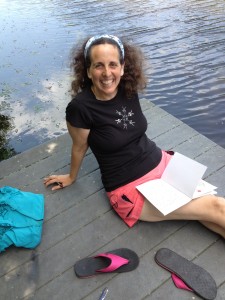
I was recently interviewed by Dawn Montefusco for her Writing from the Heart series. Not surprisingly, we found ourselves talking about writing from the head vs. the heart.
Sitting here at my computer, staring at my screen, it’s easy to drop into “head” mode. I started this blog post about writing from your heart and then realized I needed to bring more heart into it! Am I practicing what I preach?
Here are a few of my musings about writing from your heart and some tips for getting in touch with that.
There’s a Little Poet in All of Us

On the call, Dawn and I shared how we both wrote poetry as children. I can remember a sort of luminescent feeling from my childhood, awakening in our summer house on Fundy Bay, before sunrise. I’d pull the string to my light bulb (no light fixture, just a bulb) and the heat of the light bulb hatched the housefly eggs that must have been laid in the ceiling above it. A majestic and steady stream of flies emerged and buzzed about.
As the houseflies came to life, I’d reach for a notebook or blank sheet of paper and write about the previously quiet pre-dawn house, the sun as it rose over the bay painting the sky shades of pink, purple and orange, my youthful pining for love. The act of writing from my heart filled me with euphoria, no matter the topic. I could have written about the houseflies and felt high!
Nowadays, in my mind, I’ve marginalized poetry. “No one will buy that.” “You can’t write poetry.”
I repressed my own inclination towards poetry so long that when someone comes to me looking for a poetry coach, something inside me judges the value of such an activity. Where does that voice come from? I love poetry! Writing poetry provided a lifeline during my adolescence and college.
I felt so alive when I wrote poetry.
Poetry buoyed me when I worked at a draining programming job in Boston, surrounded by men who didn’t know how to relate to a female co-worker and, therefore, said things that nowadays would make a human resources director run to the legal department. I’d write poems and my feelings of anger mixed with shame about the harassment drained away.
Recently, I’ve learned to embrace poetry again–for the pure joy of writing and for the instant connection it creates with my muse. And I discovered it’s also a wonderful entry point for any writing, in order to come from a more creative and heart centered space.
The Problem With Writing From Your Head, Without Heart

When you write purely from the head, you run the risk of:
- Running out of Steam: It’s easy to lose momentum if you don’t feel passionate about your writing and your topic. Ask yourself, “Which book should I write?” based on your objectives and your heartfelt vision.
- Losing Your Readers: When you write from your head you’re more likely to talk at your readers instead of engaging them in the discovery process. For instance, you’ll tell them things without bringing the material to life. Ask yourself, “Am I picturing a reader as I write or am I writing to an amorphous glob of readers?” As you picture one reader, feel that heart connection as you write. It helps!
- Writing Something Blah: When you write purely from you head, the writing can feel stilted. When you write from your heart, there’s space for the bold metaphor, playful language, rhythm and phrasing, surprise and much more!
So, how do you write from your heart?
5 Tips for Writing from Your Heart
-

Being in nature often makes writing from the heart natural and easy. Remain Curious: Be Open to not knowing everything about the writing. Sure, have a plan. That will help create a container for the movement. But then be open to change, and keep asking questions: What am I not seeing? The best writing comes from writing yourself into discovering a deeper truth or new perspective.
- Move: Go for a walk, dance, practice yoga, qigong or tai chi. Such movement recharges mind, body and spirit and helps you enter a state of flow. I used to walk the Cliff Walk in Newport for my inspiration or climb rocks in Narragansett. My new favorite is the beach right in my neighborhood where I can practice qigong on the shore, walk out to the point where the brackish sea nursery meets Narragansett Bay and walk in the woods–all in one walk!
- Tap into Your Sense of Humor and Play: Playfulness and humor invite both you and your readers into an expansive state where your hearts are engaged and your minds are more open. How to tap into playfulness? Leave your critic at the door (maybe give her a playful activity, too) and feel free to experiment and loosen up with playful writing activities: Write a few poems out in nature before writing a chapter. I sometimes write down the different sounds I hear as I sit down to write. You can also take on a persona in your writing or play with a new voice, perhaps a funny one. Do an exercise that puts you in a more open space where control just isn’t part of the equation and see if that frees you up.
- Be Okay with “Failure.” I don’t really mean failure here but what the ego thinks of as failure. Allow yourself the space to “get it wrong.” And also allow yourself to be vulnerable in your writing knowing that you can always edit later. If you edit while writing, your censor blocks your creativity. If you tell yourself you can delete anything before you send it to others, you give yourself permission to write things you’ve been afraid of, maybe even things you haven’t admitted to yourself. It’s a powerful process.
- Connect with Your Muse: Close your eyes, take a few deep belly breaths and ask within for guidance. Let go of what you think you should do (such as where to start with the day’s writing) and ask your muse what it wants you to do right now in this moment. When you’re truly present in the moment, more can happen creatively.
How do you tap into your heart’s message when you write? Please share your insights and ideas as a comment below.



Inspirational and wonderful advise – I was just thinking the other day about how I loved writing poetry, especially Haiku – I will do that again – Thanks!
Feel free to post your haiku as a comment, Helen.
I watched your interview with Dawn.
Listening to both of you relate your experience, I tapped into my memory of adolescent creativity with poetry. I was delighted to recall my youthful enthusiasm and will inject that free floating stream of consciousness into my writing. Writing in that space uses my feeling nature more than my heady logic.
.
Deborah, that’s wonderful to hear!
Hi Lisa
I am very grateful to have come across your interview. I signed up for your free writing course and it has been a game changer. I have followed writing and inspiration coaches for a while, but our brief connection is what has inspired me to continue writing the most. I am writing a memoir and it hasn’t been easy travelling down memory lane. Your tips in this article on writing from the head vs writing from the heart is very helpful. There are areas in my book where I need to adjust and accommodate the reader. Thank you for your valuable advice. I am looking forward to learning more from you and your experience.
Wow, Joyce, Thank you so much for sharing this. I am honored and touched. Feel free to ask questions on the blog as any come up (or suggest a topic!).
Revising my novel and decided to go back and read Longfellow, to get into the spirit of metaphor–too much “info-dump” in some of my chapters. Need to see, smell, hear, etc., more. Belong to a Poetry Club, so have written some this year, but notice it lacks the joy and spirit of my earlier work. So your post hit me where I am. Especially liked the idea of writing playfully, as my work could use a little more humor, too. Wish the facility I live in had more green walking areas! We’re not far from the ocean, but it’s takes a major effort to get there. Have to close my eyes and decide I’m there more often!
Hi Marilyn,
For what it’s worth, as soon as I started reading your comment, I imagined you getting out in nature. If you can do it, it may help.
Dear Lisa,
I can’t thank you enough for introducing me to your “Meet Your Muse” exercise. It has been a game-changer for me in every aspect of the creative process. I can’t believe I ever tried to write without understanding how to access this inner wisdom! I am deeply appreciative of the practical exercises you offer that yield personal breakthroughs.
Stephanie
Wow, Stephanie. Thank you for letting me know. I’m moved to hear it. You made my day! And it shows in your writing.
I tap into my heart’s message by taking some deep breaths and placing one hand on my heart and the other below my belly button (sacral chakra energy center related to creativity, emotions, passion, relationships, +). I imagine an energetic path open up/down between my heart and sacral center…scooping up inspiration/creativity from down there to bring to my heart and sending love down the path for whatever writing is supposed to be birthed.
Sounds like a healer, Lorraine!
I have written a twenty thousand words manuscript about an innovative wife-narrative non-fiction.
I have identified pictures,illustrations and products which might make the words amount to forty or fifty words.
I have won an innovative award and I mentor teenagers and young adults using innovation as a mentoring tool,but I still feel inadequate to write the book.What do I do to beat this feeling,what might be wrong?
Hi Irene,
If it’s any consolation, feeling inadequate is common to most writers. We all have moments of self-doubt. The best thing you can do is thank your inner critic for its opinion and keep writing. You can also make a list of all the reasons you are the person to write this book. And remind yourself that you can get feedback from target readers and hire an editor. You don’t have to do it all alone!